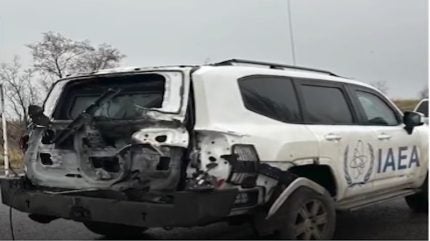
A drone hit and severely damaged an official vehicle of the International Atomic Energy Agency (IAEA) during the latest rotation of IAEA teams to the Zaporizhia NPP (ZNPP), in what Director General Rafael Mariano Grossi condemned as an “unacceptable” attack on Agency staff working to prevent a nuclear accident during the military conflict.
The IAEA staff, one driver and one security officer, who were in the armoured vehicle at the time of the incident were both unharmed, but the rear of the vehicle was destroyed. The incident occurred approximately 8 kilometres from the frontline within Ukrainian controlled territory. The vehicle was in a convoy moving towards the handover point on the frontline to meet the IAEA team that had been stationed at the ZNPP for the past month. Earlier in the day, the new IAEA team had been safely driven to the handover point for onward travel to the ZNPP.
“As Director General of the IAEA, I condemn in the most firm terms this attack on IAEA staff,” Director General Grossi said in a statement. “Fortunately, there were no victims, and our teams are safe. The rotation has been completed,” he said.
The driver of a second IAEA vehicle in the convoy saw the Kamikaze drone coming from behind and slamming into the targeted vehicle. “I have said in the past that attacking a nuclear power plant is a no go. Attacking those who care for the nuclear safety and security of these plants is also absolutely unacceptable,” Grossi said, reiterating his call for maximum restraint.
Russia’s Foreign Ministry issued a statement condemning the attack. “On December 10, during the planned rotation of experts of the IAEA Secretariat at the Zaporizhia NPP, the armed forces of Ukraine launched a series of attacks on vehicles involved in the transportation of Agency personnel,” the statement said.
“At about 15:00, an IAEA vehicle used to transport experts from the Agency’s Secretariat was attacked in the territory controlled by Kiev. At 16:37, Ukraine attacked a Russian automobile convoy returning from Kamenskoye after delivering experts from the IAEA Secretariat to the contact line.”
The Ministry added: “We share the Agency’s leadership’s indignation at these provocative and reckless actions of the Kiev regime, which not only continues to commit crimes, create threats and carry out attacks on Russian nuclear facilities, but also decided to put employees of the international organisation, as well as Russian military personnel who provide rotation, in mortal danger.”
It continued: “The attack, which could have resulted in the death of people, demonstrates the complete disregard of the Ukrainian authorities for generally accepted norms of humanitarian law and any agreements reached, as well as blatant disrespect for the immunity of employees of international organisations. We strongly condemn these actions of the Kiev regime, which believes in its impunity…. We call on the United States, Great Britain and their allies to stop any support for the Zelensky regime and take measures to bring to justice those responsible for organising and carrying out this provocation.”
Experts of the IAEA Support & Assistance Mission to Zaporizhia (ISAMZ) have been present at the plant since September 2022, after Grossi’s first visit to the NPP. Usually, a team of observers including 3-4 inspectors, works at the station for a month, before being replaced by the next group on a rotating basis. The task of ISAMZ is to monitor and assess the state of safety of the NNPP, both operational and physical.
With respect to the latest rotation, the Russian Defence Ministry reported that the Russian Armed Forces, together with Rosgvardiya units, ensured the safe conduct of the 25th rotation of observers of the IAEA mission. To ensure the safety of the IAEA observers, a ceasefire regime was declared from 7: 00 to 19: 00 along the entire route from the designated crossing point – the destroyed bridge near the settlement of Kamenskoye – in Zaporizhia region.
Before the start of the transfer, Russian sappers examined the area for unexploded foreign and Ukrainian ammunition, and after the completion of engineering reconnaissance, Russian servicemen ensured the safe passage of mission observers and their delivery to the station.
Earlier in December, Grossi said that the situation around the NPP, while fighting is taking place near the facility, continues to be tense and unstable. He added that the situation with the power supply of the plant also causes him deep concern, and he intended to discuss this issue with the Russian and Ukrainian sides in the near future.
In mid- November, Ukrainian Armed Forces launched a massive artillery attack on ZNPP. Renat Karchaa, Adviser to the General Director of Russian nuclear utility Rosenergoatom, has now said that 12 rockets were fired. He added that six missiles hit the fontana reactor cooling pool, and two hit the dry storage of nuclear waste (SSNF). “There is still a risk of repeated attacks,” he told RIA Novosti.






